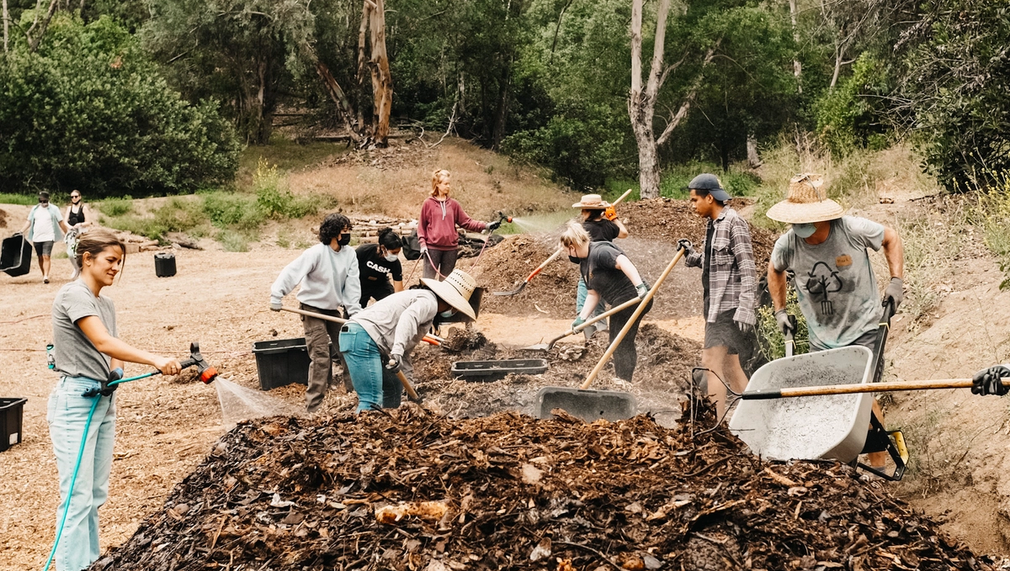Inclusive Climate Action through Community Composting
Just as fungal and microbial networks within our soils build vast networks of communication, resource sharing and structure, LA Compost emulates this resiliency response above ground through our decentralized network of Angelenos! In partnership with 50+ community-based organizations, LA Compost fosters inclusive climate action through diverse community engagement around composting and localized compost production to strengthen Los Angeles soils and community wellness.

What is the primary issue area that your application will impact?
Climate and Environment
In which areas of Los Angeles will you be directly working?
County of Los Angeles
In what stage of innovation is this project, program, or initiative?
Expand existing project, program, or initiative
What is your understanding of the issue that you are seeking to address?
In Los Angeles County, over 8 million pounds of food scraps are hauled to landfills on a daily basis, culminating to nearly two million tons, or one third of California’s food waste annually. Yet, 10% of households in Los Angeles are food insecure. Throwing food and carbon-based organics into landfills not only squanders water and energy, it releases potent greenhouse emissions that fuel Los Angeles’ rising temperatures, drought and wildfire emergencies. Facing disproportionate food and climate impacts are Los Angeles County’s densely populated, low income and Black, Indigenous, People of Color (BIPOC) communities, made vulnerable from historic disinvestment, environmental racism and food apartheid. Even as municipal and commercial waste haulers mobilize to meet federal and state food waste reduction requirements, their large-scale systems alone cannot foster community restoration of food systems, green spaces, and human connections to the land, soil, and one another.
Describe the project, program, or initiative this grant will support to address the issue.
Educational workshops include garden demonstrations and community compost turning events. These events are key as they ensure community members have a heightened understanding of their current waste system, where organics are either sent to landfill, exacerbating greenhouse gas emissions, or are driven 70 miles outside city lines for anaerobic digestion, removing them as a community resource. Volunteer opportunities allow individuals to compost, gain environmental understanding and outreach during farmers’ markets and other events. Programs include our Community Compost Coaching Program to provide technical assistance for communities seeking composting, food waste reduction and soil stewardship efforts in their neighborhoods, and Soil Farmer Program to support the leadership of South Los Angeles residents to improve their local green spaces. Food waste diversion services include our Farmers’ Market Drop-off and broader Community Partner Drop-off services for individuals to divert kitchen organics at farmers’ markets, and other community locations, Community Hub Program for households to divert kitchen organics, fuel composting and food production at community gardens, and Regional Compost Hubs which utilizes public parks and urban farms to process large volumes of organics into compost.
Describe how Los Angeles County will be different if your work is successful.
During this grant period LA Compost will engage over 2,000 volunteers around compost and providing 6,000+ hours of direct climate action, facilitate 30 accessible community education and engagement events reaching over 500 residents, divert over 1.3 million pounds of organics from landfill, generate over 130,000 pounds of local compost amendment for urban food production and green spaces, and provide compost access to 6,000 individuals. Long-term, our work will continue to promote food and environmental justice through climate action. We will continue to invest in neighborhood beautification and a green workforce, increase organics diversion from landfill and reduce large scale truck hauling within neighborhoods. Our compost production will continue to restore living soil ecosystems through fostering microbial, fungal and insect diversity, increase soils’ carbon, air, nutrient and water-holding capacity, and provide healthy food access within LA’s most food insecure communities.
What evidence do you have that this project, program, or initiative is or will be successful, and how will you define and measure success?
LA Compost measures its impact through: # of participants engaged through educational workshops # of volunteers engaged through composting events # of households served at community compost hubs # of farmers’ market drop-off individuals served # of composting initiatives supported through technical assistance lbs of food and carbon-based organics diverted from landfill lbs of compost provided to urban farmers, residents, and green spaces CO2 emissions equivalent removed from the atmosphere annually In 2021, LA Compost diverted 804,159 pounds of organics from landfills and over 80,000 pounds of compost for LA’s soils. Our efforts prevented 6,648 metric tons of CO2e from entering the atmosphere, equal to removing 1,437 cars from the road. We provided localized composting, compost education and resource access to 448 households, and engaged over 450 volunteers with 2,537 service hours completed. 34 educational workshops and events were held reaching over 1,000 residents.
Approximately how many people will be impacted by this project, program, or initiative?
Direct Impact: 6,000
Indirect Impact: 10,000